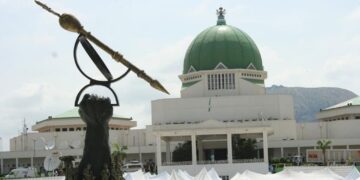[ad_1]
THE presidential and National Assembly elections of February 25 have come and gone. Congratulations to Nigerians on coming out to vote to elect a new president and parliamentarians. But for the pockets of violence in certain locations where thugs attacked voters, preventing them from casting their votes or destroying voting materials and disrupting the process, the elections were largely peaceful.
Unfortunately, the Independent National Electoral Commission (INEC) failed to fulfil its promise to conduct a transparent election. On several occasions, the chairman of INEC, Professor Mahmood Yakubu, had assured Nigerians that the results of the elections at the over 176,000 polling units would be uploaded to the iReV portal real time. However, on the D-day, the IReV portal did not work; results were not uploaded in real time. The announcement of results from the states proceeded at the National Collation Centre in Abuja with most of the polling results not uploaded. It took several days after voting for most of the polling units results to be uploaded. In many polling units, INEC personnel and election materials arrived late. This caused delays in the commencement of polling. In several locations, voting and counting extended into the late hours of the night and early morning of the following day. In others, elections had to be postponed to the following day or to March 11 when governorship and state House of Assembly elections are expected to be held. These have raised suspicion about the integrity of the results and the calls made by INEC. The integrity and legitimacy of the election have been weakened.
The logistic flaws were unexpected given that INEC had four years to prepare for the elections. It had also benefited from the learning opportunities offered by several off-season governorship elections. Besides, funds for the conduct of the elections were promptly released. Yet, the elections were bungled. Nigerians were understandably outraged about the poor performance of INEC in managing the elections. Domestic and international observers have noted the poor logistics and poor execution of various aspects of the elections and inferred that they lacked credibility and fell short of international standards and did not meet the expectations of Nigerians. The shambolic manner in which INEC handled the organisation of the elections with a lot of logistical shortcomings contributed to disenfranchising some voters, and reduction if not vitiation of the trust of voters in the process. The inability of INEC to transmit polling units results in real time to the IReV portal as promised made INEC the major culprit of the fiasco.
We urge INEC to review the logistics and other arrangements for the March 11 governorship and state House of Assembly elections to ensure that the problems encountered in the presidential and National Assembly elections do not persist. The IReV portal must be up and running and polling officials should be able to upload results in real time. We appeal to Nigerians to remain calm. They should continue to keep the peace and avoid violence. Happily, the president-elect has sought to douse tension. The candidates of the opposition parties have voiced their dissatisfaction with the elections and approached the courts in search of justice. We call on the judiciary to be impartial in handling the cases brought before it. Their decisions should return hope to the Nigerian people that their votes count in the determination of the outcome of the elections.
We acknowledge the heavy task before the president-elect, Chief Bola Ahmed Tinubu, to work to unify Nigerians and make them see the real fruits of their participation in the electoral processes.
READ ALSO FROM NIGERIAN TRIBUNE
[ad_2]





